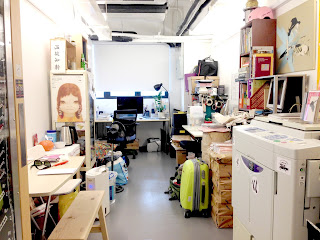Beatrix Pang, founder of Small Tune Press, interviewed by Ingrid Chu, art critic and curator.
 |
Susanne Burner, Vanishing Point: How To Disappear in China Without A Trace | 消失點:如何在中國無跡可尋 (Revolver, Berlin/Small Tune Press, Hong Kong, 2011) |
IC: Why did you start Small Tune Press?
BP: Small Tune Press began with my general interest in all things experimental
and not mainstream. I enjoyed reading and collecting comics, magazines, zines,
art books, flyers, posters, listening to weird stories, and watching cult
movies. I also learned a lot about producing images when I was studying
photography, but lacked the knowledge about their presentation and
dissemination. So, I got to know many international artists' works through
reading their artists' books in the school library, and then wondered if any
Hong Kong artists ever published books which could be read by other readers
overseas? After that, I co-published the debut issue of a photo magazine called
KLACK, and then one year later I started Small Tune Press as a
response to create and develop a space for alternative artist publications.
Also, so I could give myself the time to gain more knowledge about printing,
production, and distribution.
 |
| Beatrix Pang's art publication collection; KLACK magazine shown in cabinet |
IC: Why is it important for the imprint to be Hong Kong based?
BP: There are various choices of paper and printing technique support
in Hong Kong that makes it a good place in terms of resources and for
experimentation. The area where my studio is located in the southern side of
Hong Kong Island is called Wong Chuk Hang. It also used to be a printing
district from the 1970s to the 1990s in Hong Kong, so where many printing
factories were located. After all these years a number of printing
houses still remain and run their businesses, as well as paper suppliers. This
is a great asset for Small Tune Press to be able to stay in the neighbourhood
and have them provide support for artists’ book production.
 |
| Small Tune Press studio view |
 |
| Small Tune Press studio view |
IC: I’ve seen Small Tune Press publications in many museums and art bookshops, but you also participate in international art books fairs such as Friends with Books this year. As platforms to share artist books have begun to appear more frequently in Hong Kong and elsewhere, how do you see this developing in terms of opportunities for artists and STP?
BP: It is exciting to see the blossoming of art book fairs everywhere!
These definitely provide platforms for many creatives to present and expose
their printed works in a rather friendly and autonomous environment. These
platforms also become a space to exchange and appreciate books for both authors
and readers alike, and in a less conventional environment than say a regular
library or a bookstore.
 |
| Collection of Book Fair materials |
IC: Online platforms are becoming increasingly popular, but perhaps here more than elsewhere they run the risk of censorship that remains an ongoing concern. What relationship if any do you have to digital publishing? How does this affect your work and your your distribution methods if at all?
BP: Although Small Tune Press doesn't produce electronic publications,
the online social media channels have become a powerful tool to promote events
and information about the print publications. This allows for different ways to
describe and promote the book that in turn gets people to think more imaginatively
about the physical book even in the virtual space, and finally triggering the
desire to further explore its contents, learn more about its maker, and then
ideally purchase the book!
IC: What do you see as the future for independent publishing in Asia?
Small Tune Press (STP) is an independent art book and zine publisher founded in 2011 by Beatrix Pang, a visual artist and cultural researcher based in Hong Kong. Committed to providing opportunities for artists and creatives from various backgrounds and disciplines, it produces experimental art books and zines in different subjects and mediums for distribution in small editions. STP has also been featured in a number of international art books fairs, exhibitions, and programmes exploring the possibilities for publishing in generating new knowledge around the recent art of Asia.
All images courtesy of Small Tune Press.
Ingrid Chu
September 22, 2017